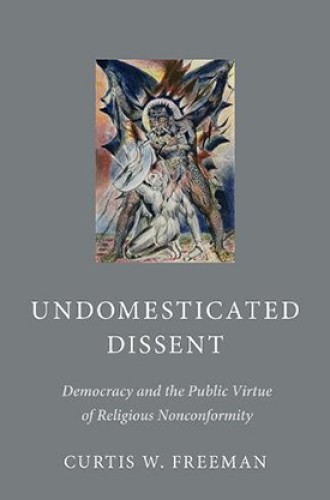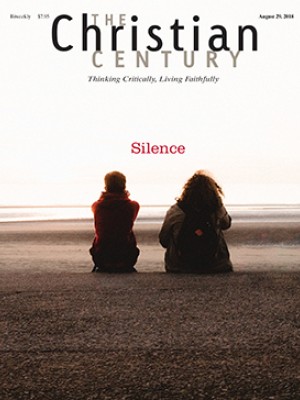The Christian act of dissent
A riveting history of religious dissenters, from William Blake to Clarence Jordan
In the late 16th century, religious dissenter Henry Barrow languished in London’s Fleet Street prison, taunted by Anglican divine Lancelot Andrewes for his stubborn refusal to acknowledge the spiritual headship of the English monarch. Across the pond and the centuries, Baptist farmer-preacher Clarence Jordan endured derision and threats in the rigidly segregated rural Georgia community where he founded Koinonia Farm, an experiment in Christian communal living.
What thread ties these two together? According to Curtis Freeman, both Barrow and Jordan stand in a living stream of faithful religious dissenters who have clung to freedom of worship, liberty of conscience, and, above all, the sovereign freedom of Jesus Christ, the one true Lord and King.
Read our latest issue or browse back issues.
This fellowship of “undomesticated dissent”—that cloud of witnesses who endured persecution from church and state in some periods and resisted the blandishments of conformity in others—is far from monochrome. Freeman’s compelling narrative bears out the complexity of a religious phenomenon characterized more by existential fortitude and a willingness to challenge authority than a set of fixed principles or doctrines. Some dissenters were early Presbyterians seeking to reform the establishment Church of England, others were separatist Baptists or Quakers, while yet others, like the Fifth Monarchists, embraced a radical political insurgency that evoked official repression. Some were tradespeople, while others achieved a greater measure of prosperity and stability. Freeman traces many of their stories, from the tumult of post-Reformation England to an increasingly post-Christian contemporary North America. This often riveting intellectual history reads at times like a novel (if the reader ignores the ample footnotes).
Though the book is a work of academic social history, Freeman, a scholar of Baptist history who teaches theology at Duke Divinity School, leaves no doubts about his passionate identification with the Baptist tradition or his constructive aims. “To put it simply, this book seeks to show how and why dissent matters, not only as a historical movement that has been laid to rest and memorialized on stone and in texts, but as a vital practice for the good of Christianity today, and, indeed, for the flourishing of free societies.” More than two centuries before the enlightened idealism of a Paine or a Jefferson emerged, he demonstrates, radical Protestants advocated for freedom and tolerance—for the sake of the gospel itself.
Amid the wealth of detail, ranging from the English civil war to the modern missionary movement, I struggled sometimes to find the crimson thread that weaves all these figures into a common fabric. Still, as Freeman stresses, the dissenting heritage is an ongoing argument or conversation embedded within the messiness of history. Some dissenters submitted to the temporal authority of the state while resisting it spiritually, while others have felt compelled by conscience to engage in open civil disobedience (as in the modern civil rights and antiwar movements). Dissent is always contextual and lived moment to moment. Nor is it merely obstructive; rather, faithful protest is “grounded in a profound ‘Yes!’ to Jesus Christ as Lord, to God alone as sovereign over the conscience, and to the gathered community where Jesus Christ reigns and is discerned together.”
Freeman anchors the book with profiles of three distinguished literary figures, all of whom are memorialized in the nonconformists’ cemetery in London called Bunhill Fields. John Bunyan, a tinker and lay preacher, wrote his epic spiritual autobiography The Pilgrim’s Progress (1678) while jailed for leading illegal Baptist conventicles. Bunyan marshaled the apocalyptic fervor of earlier dissenters and retooled it into an account of personal conversion.
Once Protestant nonconformity became (more or less) tolerated, stalwarts like the Presbyterian Daniel Defoe rose up and urged fellow dissenters to follow their conscience by refusing, for example, to take communion in an Anglican church, which was a requirement for civil service. In his masterpiece Robinson Crusoe (1719), Defoe subverts Bunyan’s otherworldliness, urging believers to work out their vocations amid the responsibilities of everyday life.
I was struck especially by Freeman’s stunning commendation of the work of visionary poet and printmaker William Blake, manifest in his radically apocalyptic work Jerusalem (1804). Marginal and misunderstood in his time and perhaps also ours, Blake attacked the inhumanity of the “dark satanic mills” that littered the landscapes of early industrial capitalism.
Freeman rejects the common depiction of Blake as an esoteric mystic who anticipates Thomas Altizer’s death-of-god theology. Rather, he makes a compelling case for reading the poet as a radical Christian prophet who longs to see a just and liberated new Jerusalem subsume “England’s green and pleasant land,” even if Blake’s antinomian commitments did complicate his relationship to organized religion. Freeman captures Blake’s vision of a remade society with eloquence: “It is the London of the Songs of Experience, a city full of soot-covered buildings and filled with faces marked by weakness and woe, a wretched place where the winding worm of mortality devours the innocents like Moloch and Chemosh of old.”
Across their differences, Bunyan, Defoe, and Blake share what Freeman calls an apocalyptic imagination, which, far from fostering quietist detachment, lends urgency for concrete social action. He writes, “It is the apocalyptic imagination that provides dissenters with a subversive social vision and strengthens their conviction to resist the powers of domestication.” This radical tradition lives on today in broadly ecumenical—and interfaith—forms. From Martin Luther King Jr. to the Catholic brothers Berrigan, from Thomas Merton to Birmingham church bombing survivor Carolyn McKinstry, believers dare to believe in the coming new creation, and then respond accordingly.
This article was updated on September 24, 2019 to correct the date and context of Henry Barrow’s imprisonment.







